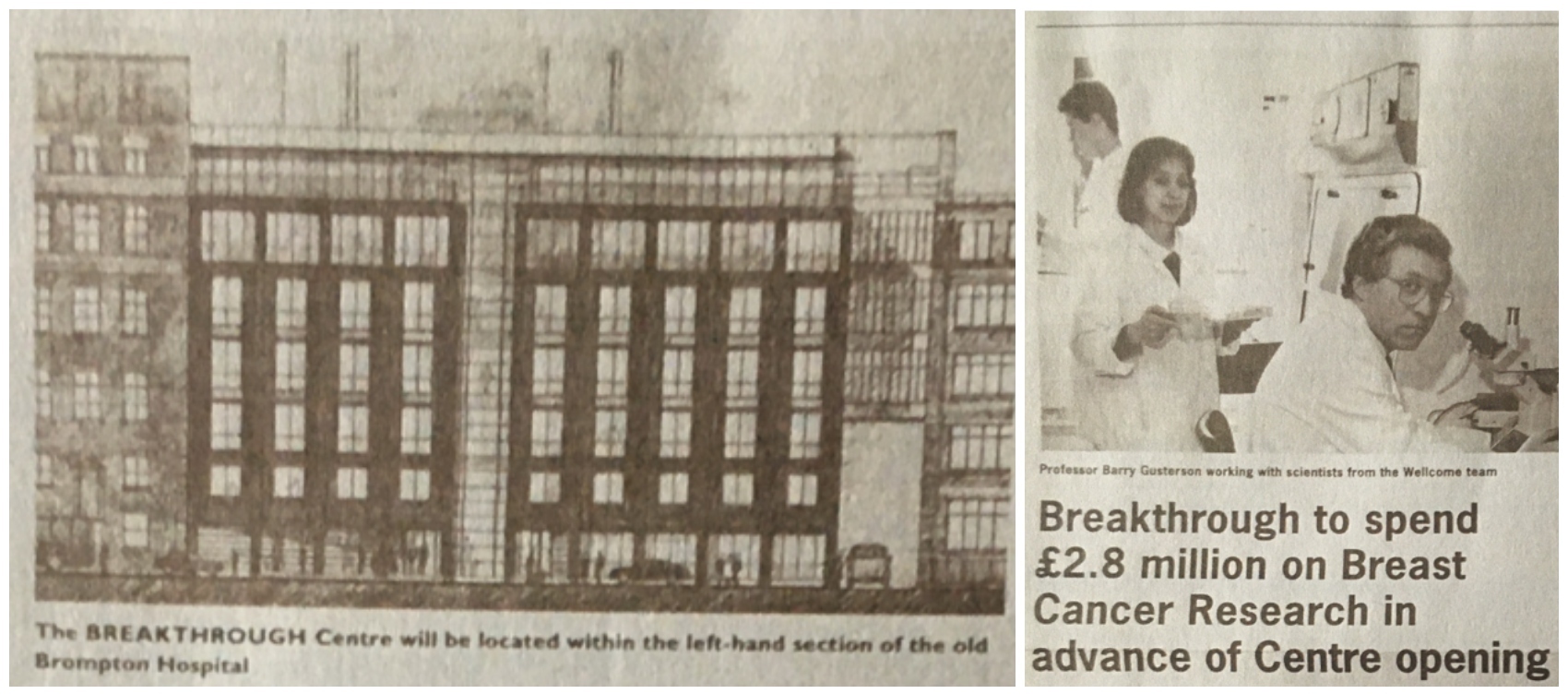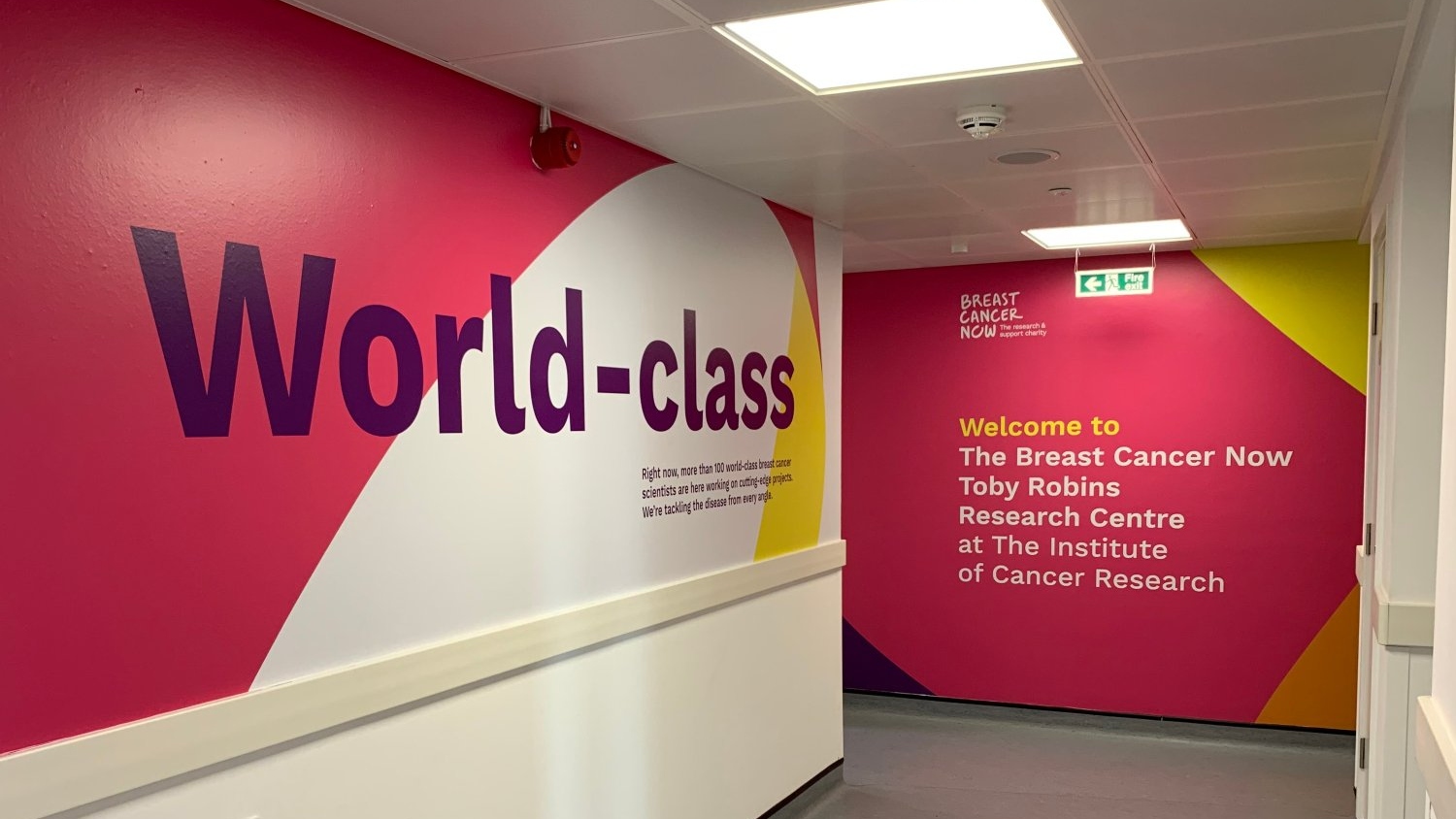The ICR’s dedicated breast cancer research centre was launched 25 years ago. Robbie Lockyer explores the history of the centre and how our scientists working in it have made a difference for patients.
Until the late 1980s, the breast cancer mortality rate in women in their mid-30s to the age of 70 had been steadily rising in the UK and around Europe. At that time, Bill Freedman, a theatre and TV producer, lost his wife, Toby Robins, to breast cancer. Bill was determined to honour her legacy and make a difference for other women with breast cancer.
With Professor Barry Gusterson, Professor of Histopathology at the ICR and The Royal Marsden, Bill and his family came up with the idea to establish the UK’s first dedicated breast cancer research centre. Following a wave of public and celebrity backing – including fundraising campaigns led by Breakthrough Breast Cancer (a predecessor charity to Breast Cancer Now) and publicity garnered with the Spice Girls – in December 1999, the Breast Cancer Now Toby Robins Research Centre at the ICR was officially opened by His Majesty King Charles III, who was His Royal Highness The Prince of Wales at the time.

Putting fundamental biology at the heart of cancer research
25 years and many discoveries later, researchers, clinicians and supporters gathered to mark the 25th anniversary of the centre with a scientific symposium that reflected on the centre’s legacy, celebrated major milestones and looked ahead to its future.
Professor Andrew Tutt, Professor of Breast Oncology, Head of the Division of Breast Cancer Research and Director of the Breast Cancer Now Toby Robins Research Centre at the ICR, chaired the symposium and opened it with a powerful reflection on the centre’s journey.
From the outset, the centre was built on the principle of putting fundamental biology at the heart of cancer research, with a mission to use science to influence care and policy. Professor Tutt described the centre’s evolution into a hub where wet lab research and clinical trials work in synergy, enabling discoveries to move rapidly from laboratory bench to hospital bedside. One early breakthrough was a discovery that supported the development of PARP inhibitors for BRCA-mutant cancers, which have transformed treatment for thousands of patients globally.
Other major advances led by the Centre include the development of aromatase inhibitors – now a standard hormone therapy for post-menopausal breast cancer – and predictive tests like IHC4 to identify which people with hormone sensitive breast cancer will benefit from chemotherapy.
Describing the more recent outputs and progress enabled by the centre, Professor Tutt said: “Over the past decade, the centre has delivered more than 400 manuscripts, 13 clinical trials and 10 novel breast cancer drug target candidates. It has welcomed new group leaders in a range of disciplines including immunology, data science and cancer stem cell research.”
An overarching theme addressed throughout the symposium was the importance of embracing complexity – whether in the biology of breast cancer, the diversity of patient responses or the evolving landscape of treatment resistance.
The symposium featured a range of presentations that showcased the breadth and depth of breast cancer research being carried out at the centre, as well as other institutions and commercial partners across the UK and internationally with whom the Research Centre collaborates.
The speakers highlighted how the centre’s multidisciplinary approach enables researchers to tackle these challenges head-on, combining expertise in genomics, immunology, cell biology, biomarker development and clinical trials to drive progress.
Scientific progress and future directions
Professor Nick Turner, Professor of Molecular Oncology in the Breast Cancer Now Toby Robins Research Centre at the ICR and Director of Clinical Research and Consultant Medical Oncologist at The Royal Marsden, shared insights into the evolution of CDK4/6 and AKT inhibitors as well as the growing role of liquid biopsy blood tests in predicting resistance and treatment. His work on the SERENA-6 trial is currently helping to refine how therapies are matched to individual patients, particularly those with endocrine receptor-positive breast cancer.
Professor Turner’s team was also behind a major breakthrough in 2015 – the development of highly sensitive liquid biopsies that can detect breast cancer returning months before hospital scans. These tests are now being trialled to explore their potential to change how breast cancer is treated in the future.
Professor Turner said: “We are also looking to predict which patients with triple negative breast cancer will respond best to treatment – a main priority is identifying which patients need less treatment, so we need to develop biomarkers to find patients to be treated with less, and better.”
Reflecting on the journey of synthetic lethality from concept to clinic, Professor Chris Lord, Deputy Head of the Breast Cancer Research Division and the Deputy Director of the Breast Cancer Now Toby Robins Research Centre at the ICR, highlighted the centre’s pivotal role in the discovery that PARP inhibitors could very selectively kill cancer cells with BRCA gene faults– a finding first published in 2005 and now the basis for smarter and kinder life-saving treatments such as olaparib and talazoparib in breast cancer and several other PARP inhibitors across other cancer types.
Professor Lord also discussed the next phase of research, which embraces the complexity of multiple genetic drivers in cancer.
Meanwhile, Professor Pascal Meier, Professor of Cell Death and Immunity in the Breast Cancer Now Toby Robins Research Centre at the ICR, explored the concept of immunogenic cell death, presenting early results from the ASTEROID trial and discussing how cell death pathways can be harnessed to trigger anti-tumour immune responses.
Professor Meier said: “The best way to treat cancer is to kill it. We now know that how a cell dies matters – inflammatory cell death, necroptosis, unlike programmed cell death, apoptosis, sends danger signals that activate the immune system. We’re learning how to turn cell death into a therapeutic tool.”
Professor Clare Isacke, Professor of Molecular Cell Biology in the Breast Cancer Now Toby Robins Research Centre at the ICR, focused on the metastatic niche – a supportive microenvironment in a secondary organ where cancer cells can survive, grow and form a new tumour after spreading from the primary tumour – particularly the role of cancer-associated fibroblasts and a collagen receptor called Endo180.

Talks from beyond the ICR
Several external speakers, who contributed valuable perspectives and research milestones beyond the work of the ICR, spoke at the event, reinforcing the notion that breast cancer research is an international collaborative effort.
Professor C. Kent Osborne, Professor of Medicine, Haematology and Oncology at Baylor College of Medicine in Texas, discussed the complexity of endocrine therapy, while Professor Jason Carroll, Professor of Molecular Oncology at The University of Cambridge, explored the role of pioneer factors such as FOXA1 in breast cancer metastasis.
Professor Jos Jonkers, Professor of Molecular Experimental Oncogenetics and Cancer Therapeutics at The Netherlands Cancer Institute, presented advances in mouse modelling BRCA-mutant cancers, and Dr Susan Galbraith, Executive Vice President of Oncology Research and Development at AstraZeneca, outlined transformative trends in breast cancer medicines, including the development of antibody-drug conjugates and cell therapies.
Professor Serena Nik-Zainal, Professor of Genomic Medicine and Bioinformatics and Honorary Consultant in Clinical Genetics at The University of Cambridge, closed the symposium with a compelling discussion on mutational signatures and the potential of whole-genome sequencing to personalise cancer treatment.
Looking ahead
All those years since Bill Freedman and Barry Gusterson first thought up the idea of the centre, it’s hugely comforting to know that breast cancer survival rates have significantly improved – 9 in 10 people today will survive breast cancer for five years or more. Research has played a major role in that turnaround, with the Breast Cancer Now Toby Robins Research Centre at the ICR contributing considerably – a contribution recognised through the 2022 AACR Team Science Award, shared with partners at The Royal Marsden.
But no one is resting on their laurels. The symposium was a celebration not just of past achievements, but of the centre’s enduring commitment to improving the lives of people affected by breast cancer.
Professor Tutt said: “As I reflect on our mission, it’s fantastic to see how far we’ve come, yet there’s still much to do. By continuing to work together – across research divisions, institutions and international borders – we can solve the problems and address the complexities we can’t do alone. That’s how we’ll make the next 25 years even more impactful than the last.”
With a bold vision for the future and an enduring collaborative spirit, the Breast Cancer Now Toby Robins Research Centre continues to lead the way in translating science into improvements in care for those affected by breast cancer.
-invading-through-a-layer-of-fibroblasts-(stained-for-actin---red)-nuclei-were-counterstained-with-dapi---blue.jpg?sfvrsn=1a303c1_1)